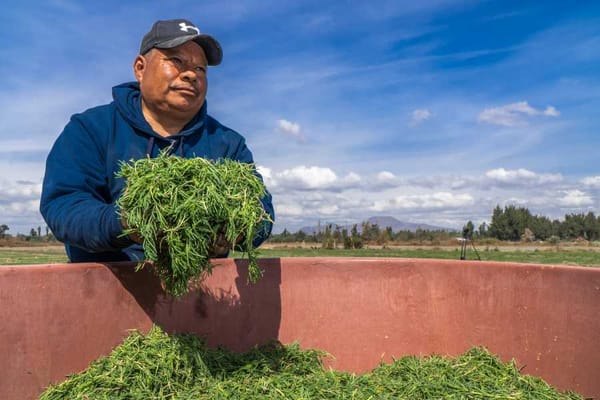AMLO Tackles Informal Economy, Transgenic Corn, and More in Morning Conference
President AMLO discusses Mexico's informal economy, transgenic corn, the autonomy of the judiciary, and constitutional reforms. He brings attention to key issues and showcases his commitment to combating corruption and improving the welfare of the people.

President Andres Manuel Lopez Obrador (AMLO) kicked off his morning conference today, addressing a range of topics including the informal economy, transgenic yellow corn, the autonomy of the judiciary, and upcoming constitutional reforms. As always, the President's charismatic style and straightforward approach made for an engaging session.
The President began by acknowledging the persistent issue of the informal economy, which continues to affect a significant portion of the economically active population. Despite the growth of the formal economy during his administration, AMLO expressed his commitment to promoting the creation of more formal jobs with good salaries.
He also recognized the vital role played by the informal economy and the migrant population who send remittances, contributing to Mexico's economic recovery. AMLO attributed this achievement to the resilience of the people, even in the face of corruption and neglect during the neoliberal era.
The topic then shifted to transgenic yellow corn, an issue that has raised concerns in Mexico. AMLO made it clear that his administration does not permit the use of transgenic corn for human consumption; it is only allowed for animal fodder. He emphasized the importance of public health and stated that Mexico is working with the U.S. government to explain its position and reach agreements on this matter.
AMLO further expressed his desire to conduct a joint study with the U.S. to determine the transgenic nature of yellow corn and its potential health risks. However, he noted that the U.S. has been reluctant to accept this proposal, claiming support from Nobel Prize winners in Biology and research centers. The President stated firmly, "We are not going to allow it."
In a bold move, AMLO announced that an agreement would be signed this week to exclusively use white corn in tortilla factories. This decision aims to prevent the importation of transgenic white corn and promote the purchase of corn from national producers. The President emphasized the need to support small white corn producers in the north of the country while addressing the protests from large producers dissatisfied with the subsidies they receive. He firmly stated, "We are not going to continue with this model of supporting those at the top."
Moving on, AMLO touched upon the autonomy of the judiciary and the alleged irregularities in its functions. While respecting the autonomy of the Judicial Power, he noted that certain decisions made by judges have raised concerns, particularly when criminals are set free. He clarified that the Executive Power does not have the authority to dismiss a judicial authority, but expressed his commitment to addressing delicate issues and ensuring justice.
Regarding allegations of embezzlement in the budget administered by the General Directorate for the Dissemination of Science of the National Autonomous University of Mexico (UNAM), AMLO stressed the importance of respecting university autonomy. If there are irregularities, he believes it is the responsibility of university students themselves to address them.
AMLO didn't shy away from discussing the media landscape in Mexico. He criticized biased reporting and singled out Reforma newspaper, suggesting that its writers often serve specific interests. The President emphasized the importance of focusing on the people's concerns and avoiding complacency within the "red circle" of the political class. He urged the media to respect and acknowledge the existence of the people.
Undoubtedly, corruption remains a key issue for the AMLO administration. The President reiterated that combating corruption and impunity is crucial for Mexico's rebirth. He encouraged citizens to denounce any act of corruption, emphasizing that no one should be exempt from accountability.
Shifting gears, the Tax Administration Service's investigations into tax evasion by civil organizations were also addressed. AMLO clarified that the objective is not to persecute anyone but to avoid being complicit in illegal practices or engaging in cover-ups.
AMLO took a moment to address the alleged persecution against Marcelo Ebrard, former Secretary of Foreign Affairs and a potential presidential candidate. The President revealed that Ebrard had been subject to unwarranted scrutiny and even voluntary exile due to a campaign against him. AMLO urged caution in discussing these issues during the conference to avoid any perception of favoritism towards presidential aspirants.
In a spirited tone, AMLO announced his intention to present constitutional reforms, including establishing 65 as the universal age to receive a pension for senior citizens. He also expressed his determination to introduce measures to ensure the respectful treatment of animals. These initiatives are part of a package of reforms that will be sent starting in September.
Concern for the environment was evident in AMLO's discussion of the protection of bees and the abuse of clearing, logging, and agrochemical use. The President emphasized the importance of complying with the law and caring for the territory and nature. Collaborative efforts are underway with Mennonite communities to avoid the use of glyphosate as an herbicide in transgenic soy farming.
As the morning conference progressed, AMLO welcomed Mara Lezama, governor of Quintana Roo, who highlighted the economic programs aimed at revitalizing and improving the state's economy. Lezama emphasized the importance of distributing the wealth and prosperity fairly generated by the Mayan Train among all the state's inhabitants.
Another significant update was the arrival of ecological diesel, which will be used in the Mayan Train to mitigate climate change. The President informed the audience that the ecological fuel is already being delivered to certain areas in the southeast of the country and will be produced at the Deer Park refinery. This initiative aims to replace internal combustion vehicles with a more environmentally friendly alternative for passenger and cargo transportation.
Diego Prieto, head of the National Institute of Anthropology and History, provided insights into the archaeological salvage efforts along sections 5, 6, and 7 of the Mayan Train. The ongoing recovery of archaeological information has yielded remarkable finds, including 11 Promeza Archaeological Zones, thousands of ceramic fragments, burials, and other significant artifacts. The INAH is diligently working to preserve and explore these sites, including Muyil, Tulum, El Meco, Oxtankah, Dzibanché, Ichkabal, Chacchoben, and more.
Lastly, authorities reported on the progress of sections 5, 6, and 7 of the Mayan Train, which will stretch from Cancun to Escarcega and the border with Belize and Guatemala. Once completed, visitors will have the opportunity to explore cenotes, archaeological sites, and various tourist attractions. The construction work is well underway, with thousands of workers dedicated to the project.
In summary, AMLO's morning conference covered a range of crucial topics, demonstrating his commitment to addressing the informal economy, transgenic yellow corn, corruption, constitutional reforms, and environmental concerns. The President's determination to prioritize the welfare of the people and eradicate corruption was evident throughout the session.




